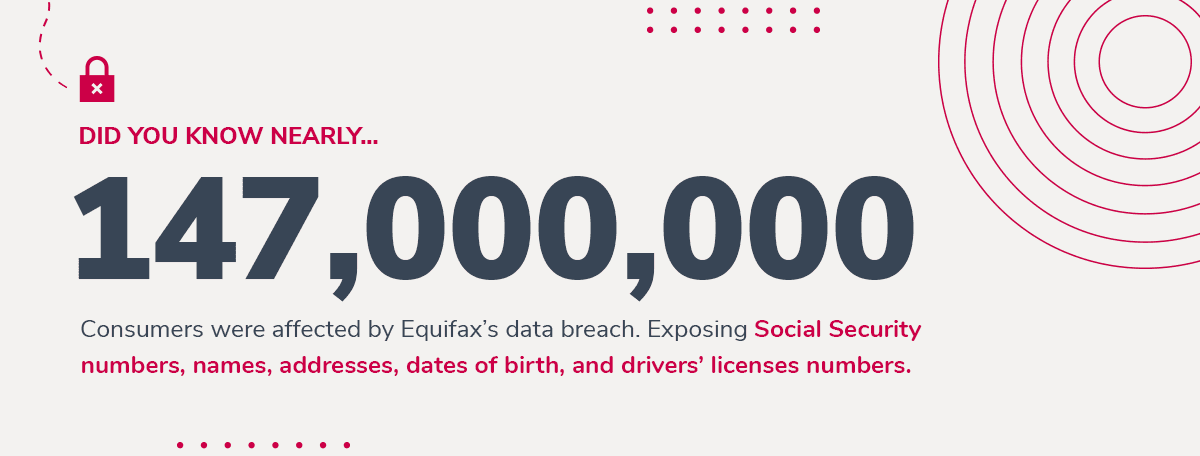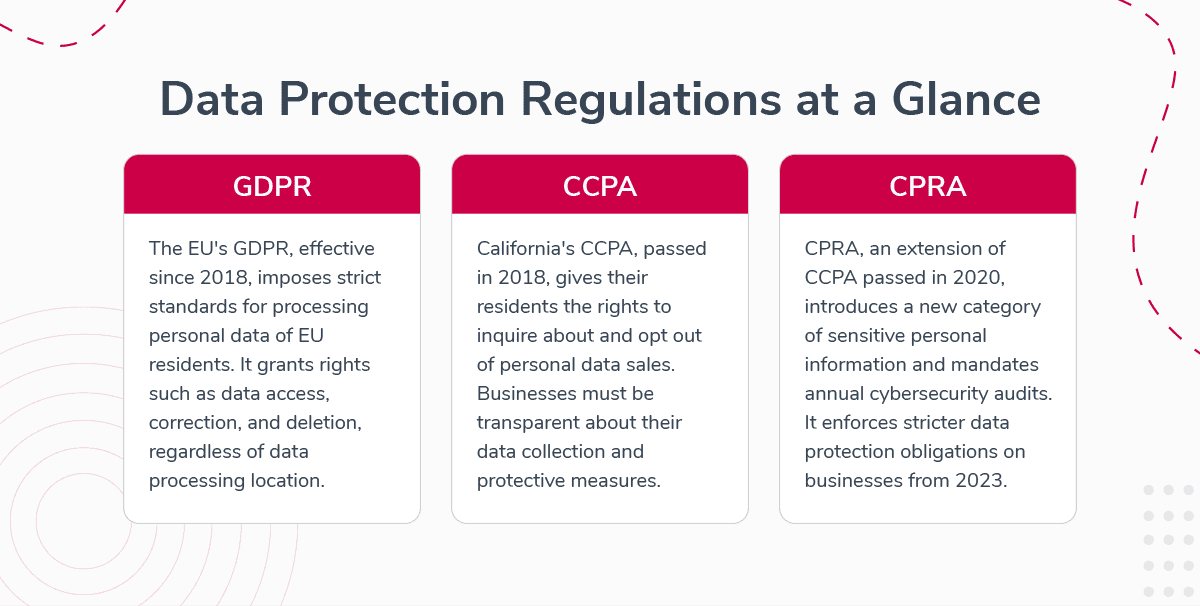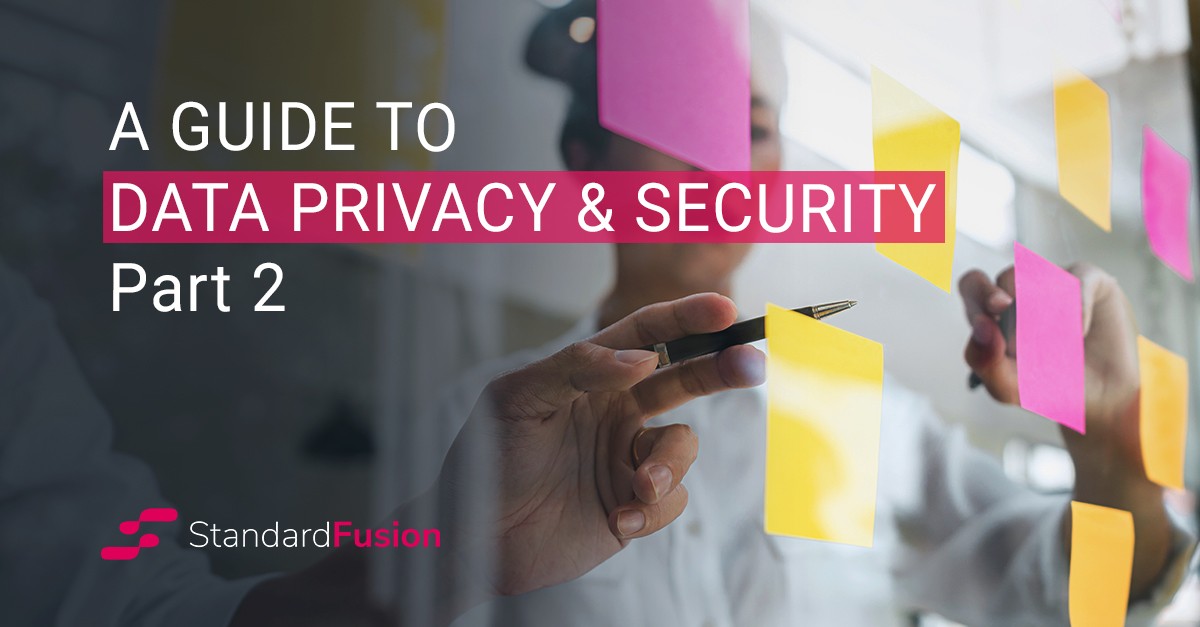Published on: Dec 1, 2023
Privacy Management: Securing Information, Building Trust, and Enhancing Brand Perception
This article will help you understand vital details about privacy management, such as: Why you should protect customers' personal data, the significant impact of privacy practices on your brand's perception, how privacy management influences your financial health, and much more.
Let's get started!
What is Privacy Management and Why do you Need it?
Privacy management is the strategic process of handling personal information in a way that respects individual privacy and complies with relevant laws. It's a crucial aspect of modern business, especially as companies increasingly rely on personal data for their operations.
Recent years have seen an alarming increase in high-profile data breaches, underscoring the imperative for a privacy program. These breaches serve as reminders of the critical need for proactive and systematic approaches to data protection.
This is key:
As compliance managers navigate legal obligations and technological advancements, cultivating a resilient privacy program becomes paramount. However, the importance of privacy management extends beyond legal compliance; it's fundamental in building and maintaining customer trust.
In an age where data privacy concerns are a priority, customers are more likely to engage with brands that demonstrate a commitment to protecting their personal information.
Additionally organizations need privacy management as it helps with:
Navigating the Complexity of Regulations
Data privacy laws are intricate and constantly evolving, posing a significant challenge for businesses. To effectively manage compliance, organizations need to be acutely aware of all applicable regulations and understand their nuances. This requires not just knowledge but also the ability to adapt to changes swiftly.
Resource Constraints in Privacy Management
For many small and medium-sized businesses, the journey to compliance is hindered by limited resources. Finding the right tools and professionals to maintain adherence to stringent data privacy requirements can be resource-intensive. Yet, this investment is crucial to prevent costly breaches and maintain customer trust.
Strategic Approaches for Limited Resources
Adopting a strategic approach by embedding data privacy into the core of the organization can help navigate these challenges. Even with limited resources, prioritizing privacy management from the outset can streamline processes and enhance resilience.
Staying Informed and Proactive
To stay ahead, businesses should leverage solutions that offer updates on legal developments and best practices. Subscribing to industry newsletters or engaging with regulatory guidance tools can provide invaluable insights, ensuring that compliance is not just a checkbox but a cornerstone of trust and transparency
Understanding the Difference: Data Privacy vs. Data Security
While related, data privacy and data security are distinct concepts that often get confused. Let's break down their differences.
Data Privacy focuses on the rights of individuals over their personal information. It empowers people to control how and when their data is accessed and used. Depending on applicable laws, organizations must ensure certain rights, such as consent and access, are upheld. These regulations might dictate how long data can be kept, define specific protections, or leave decisions to the discretion of the organization.
Key elements include:
Consent: Individuals must agree to have their data collected.
Transparency: Clear policies about data use and sharing.
Access Rights: Enabling individuals to view or delete their data.
Data Security, on the other hand, is about safeguarding data against unauthorized access, theft, or damage. It involves implementing measures to protect data from breaches, regardless of privacy considerations. Organizations are often required to meet baseline security standards, but the approach and specifics can vary widely unless specific regulations dictate otherwise.
Key components include:
Encryption: Protecting data through advanced coding.
Access Controls: Restricting data access to authorized users.
Regular Audits: Monitoring and testing security measures.
Though distinct, data privacy and data security are interconnected. Effective data security helps ensure privacy by limiting the potential for unauthorized data exposure. Conversely, compliance with privacy laws inherently requires certain security measures to be in place. High-profile data breaches often highlight failures in both privacy and security, as insufficient protections can lead to unauthorized access of personal information.
In essence, data privacy is about the governance and ethical handling of information, ensuring individuals' rights are respected. Data security provides the technical infrastructure necessary to protect personal data from potential threats.
The Role of Privacy Management in Protecting Customer Information
Privacy management, as defined by Gartner, is a framework that ensures an organization's data processing activities comply with privacy regulations. It's a structured approach combining multiple disciplines into frameworks and policies.
If you are still wondering if a Privacy Program is really necessary, you should know that
in the past year, major organizations faced significant data breaches, putting millions at potential privacy risk. Equifax, a leading credit agency, experienced a breach affecting nearly 147 million consumers, exposing sensitive data like Social Security numbers.
Also, Microsoft, a multinational tech giant, fell victim to a targeted attack, leading to unauthorized access to email accounts of over 30,000 corporate customers. These breaches underline the challenges in securing vast amounts of personal data. Compliance managers must urgently enhance their privacy programs to address evolving threats and regulatory scrutiny.
Understanding Data Challenges
In today's digital landscape, the mantra "Data is the new oil" has driven businesses to collect and retain as much data as possible. Many companies, even with new regulations, still believe that more data equates to better insight and competitive advantage.
However, the sheer volume of data businesses accumulate is becoming a double-edged sword. The systems designed to harness data are now creating environments where organizations are drowning in information. This not only heightens the risk of security breaches but also complicates compliance efforts.
Addressing Overload and Compliance
Organizations must navigate the labyrinth of data ownership, purpose, and processing requirements. The larger the data pool, the more difficult it is to ensure compliance with privacy laws. For companies overwhelmed by data, the first step is conducting a data inventory or record of processing activities (RoPA). This foundational step is crucial even if it doesn't capture every detail initially.
The urgency to implement robust privacy programs is underscored by recent high-profile breaches. As companies face increased scrutiny, establishing a clear and comprehensive approach to data management is no longer optional but essential.
Key Components of Privacy Management:
Data Privacy Impact Assessments: Regular assessments to evaluate how personal data is handled and identify potential privacy risks.
Fulfilling Individual Privacy Rights: Respecting and addressing the privacy rights of individuals as per legal requirements.
Analyzing and Recording Data Flow: Keeping detailed records of data flow, including personal and sensitive data, the purposes of processing, and retention policies.
Data Breach Management: Tracking, remediating, and accurately reporting data breaches, coupled with well-documented privacy policies and notices for staff and consumers.
Cross-Departmental Involvement: Privacy management involves various roles like chief data officers, privacy officers, compliance officers, and security analysts. It spans across multiple departments, making integrated communication essential. To effectively manage data privacy, collaboration across these teams is critical. This collaboration is not just about sharing information; it's about proactively educating team members on their data privacy responsibilities. By doing so, organizations can minimize risks and ensure that each department understands its role in safeguarding data.
Effective privacy management extends beyond mere compliance. It entails implementing advanced, automated tools to ensure uniform policy application across an organization. This not only protects customer data but also enhances overall operational integrity, reducing the likelihood of human error and regulatory violations.
Importance of Automated Tools
Automation in data privacy management transforms how organizations handle sensitive information. Key features to consider in automated solutions include:
Consent Management: Automate the collection and management of user consent, ensuring compliance with regulations like GDPR and CCPA.
Risk Assessment: Quickly identify and assess potential privacy risks, allowing for prompt and informed decision-making.
Privacy Impact Assessment: Streamline the process of evaluating the potential effects of projects on data privacy.
Moreover, automation facilitates:
Tracking Data Subject Access Requests (DSAR): Efficiently manage requests from individuals seeking access to their personal data.
Data Discovery and Mapping: Automatically locate and categorize data across systems, providing a comprehensive view of data flows.
Policy Generation and Maintenance: Easily create and update privacy and cookie policies to reflect current practices and regulations.
Security Protocols: Implement robust security measures such as encryption and user authentication to safeguard data integrity.
Data Editing Options: Allow customers the flexibility to update their personal data, enhancing transparency and trust.
Managing privacy is a multifaceted process that demands collaboration across various teams—legal, tech, HR, and development. Automation alleviates the manual burden, enabling teams to focus on strategic initiatives and fostering a culture of proactive education and compliance. By reducing manual intervention, the right data privacy risk management software not only lightens the load but also enhances the organization's ability to address privacy challenges effectively.
How Data Privacy Management Enhances Data Governance
Having scattered data is more than just a nuisance; it's a threat to your organization's security and efficiency. Imagine being unable to quickly locate important data, causing delays and disruptions. This chaotic state casts a negative shadow on your business operations.
Risk Mitigation: Effective data privacy management is crucial for robust data governance. It reduces the risk of non-compliance with regulations like GDPR, which demands that organizations provide access to, modify, and delete personal data upon request. Being disorganized can lead to hefty fines and reputational damage if you fail to honor these rights due to misplaced data.
Structured and Accessible Data: By implementing structured data privacy management, your data becomes organized, easily navigable, and secure. This streamlined approach means that data is systematically stored and indexed, eliminating the frantic search for necessary information when decisions need to be made swiftly.
Boosted Productivity and Trust: When your team knows exactly where to find information, it enhances productivity, allowing more time to focus on strategic tasks rather than data retrieval. Furthermore, maintaining a high standard of data governance builds trust with clients, as they feel confident that their personal information is handled responsibly and ethically.
In conclusion, integrating data privacy management into your data governance strategy not only helps in legal compliance but also enhances overall organizational efficiency and trustworthiness.

What Are the Top Challenges in Data Privacy Management?
Navigating data privacy management can often feel like traversing a complex maze. Here are the prominent challenges organizations face on this journey:
1. Embedding Data Privacy from the Start
One significant hurdle is the tendency to overlook privacy until it becomes an issue. Organizations frequently add it as an afterthought, which can lead to non-compliance, breaches, and fines. Making data privacy a foundational part of your business strategy is crucial. This includes integrating it into onboarding processes and ongoing employee training to ensure awareness and adherence to best practices.
2. Grappling with Complex Regulations and Limited Resources
Data privacy laws are not only intricate but also constantly evolving. Keeping track of applicable regulations and understanding them thoroughly requires significant effort. However, many small and medium businesses find themselves strapped for resources. The key is to adopt a strategic approach to privacy and security, embedding it into the organization's core processes to sustainably manage compliance, even with limited tools and personnel.
3. Managing the Deluge of Data
In the digital age, businesses have often operated under the notion that "more data is better," amassing vast quantities of information. While this has driven growth for tech giants, it now poses a substantial challenge. Organizations must know the details of each piece of data—ownership, purpose, processing methods, and retention timelines—to meet compliance requirements. The sheer volume of data can make this task formidable.
To begin addressing this issue, organizations should conduct a data inventory or maintain a record of processing activities (RoPA). Despite the potential for overwhelming data volumes, these steps are essential for laying the groundwork for effective data management and compliance.
By prioritizing privacy, understanding regulatory landscapes, and managing data wisely, organizations can better navigate the challenges of data privacy management.
How Do Data Privacy Management and Data Security Support Each Other?
Data privacy management and data security are intrinsically linked, working in tandem to safeguard sensitive information. Here's how they reinforce each other to protect your data effectively:
Mutual Reinforcement
Data Security Compliance: Privacy laws often set a baseline for security standards. While they don't dictate specific measures, they require compliance. Adhering to these laws ensures essential protections are in place, reducing breaches that could expose private data.
Reduced Exposure: By managing data privacy effectively, organizations limit unnecessary data retention. This minimizes the amount of sensitive information that could be compromised during a security breach, thus enhancing overall safety.
Benefits of Data Privacy Management
Identify High-Risk Areas: A strong privacy management system allows for pinpointing areas where high-risk data is stored. Knowing these areas helps focus security measures, providing stronger defenses where they are needed most.
Minimizing Retention Risk: Regular reviews ensure unneeded data is deleted or anonymized, which lowers the risk for both the organization and its users. This proactive approach discourages data hoarders, reducing potential attack surfaces for cyber threats.
Harmonized Strategy
Together, robust data privacy management enhances data security by establishing clear policies, auditing data use, and enforcing access controls. When these elements are implemented effectively, they not only comply with regulations but also create a security-first environment. These elements, interwoven seamlessly, ensure your organization is not just compliant but also resilient against threats that seek to exploit data vulnerabilities.
Building Customer Trust Through Effective Privacy Management
Recently, exemplary models of robust privacy programs have emerged from industry leaders, showcasing a commitment to safeguarding sensitive information. One standout example is Apple Inc., renowned for its meticulous approach to privacy.
Apple has distinguished itself by integrating privacy features directly into its products and services. The company prioritizes data minimization, ensuring that only essential information is collected, and employs on-device processing to reduce reliance on cloud-based storage.
Additionally, Apple's emphasis on user transparency is evident through features like the App Tracking Transparency framework, empowering users to control how their data is shared across applications.
This proactive stance, coupled with regular privacy audits and a strong commitment to user education, has positioned Apple as a paragon of privacy-conscious corporate governance.
Transparent and robust privacy practices reassure customers that their personal data is handled with utmost care and respect.
How Can You build This Trust and Transparency?
Open Communication: Clearly communicating privacy policies and data usage practices builds a foundation of transparency. Customers feel more secure when they understand how their data is used.
Consent and Control: Giving customers control over their data, including easy options for consent and opt-out, enhances their confidence in the brand.
Proactive Data Protection: Implementing proactive measures for data protection, such as strong encryption and access controls, demonstrates a commitment to safeguarding customer information.
Prompt Response to Privacy Concerns: Quickly addressing any customer concerns or questions about privacy practices further strengthens trust.
Continuous Improvement: Regularly updating privacy practices to reflect new regulations and technological advancements shows a dedication to maintaining high privacy standards.
Regular Privacy Audits: Conducting and communicating the results of regular privacy audits demonstrates a commitment to continuous privacy protection.
Employee Training: Regular training for employees on privacy policies and data handling reassures customers that their data is handled by informed personnel.
Transparency in Data Breaches: Being open about data breaches, if they occur, and the steps taken to address them, can actually increase customer trust in how seriously a company takes data security.
User-friendly Privacy Tools: Providing customers with easy-to-use tools for managing their privacy settings empowers them and enhances trust. Check this article to learn more about integrated GRC platforms.
Engagement and Feedback: Actively engaging with customers and seeking feedback on privacy policies and practices shows that a business values customer opinions and is willing to make improvements.
By focusing on these aspects, businesses not only comply with privacy regulations but also establish a bond of trust with their customers, turning privacy management into a strategic asset rather than a compliance necessity.
Privacy Management's Impact on Financial Health and Brand Perception
Robust privacy management significantly enhances a brand's image. In an era where data breaches regularly make headlines, a brand known for strong privacy practices stands out positively.
This commitment to privacy not only fosters immediate customer trust but also builds a reputation for reliability and integrity.
Long-term, these good privacy practices translate into a strong brand reputation.
Why?
Because customers are more likely to stay loyal to and advocate for brands they trust. Moreover, this reputation for safeguarding customer data can become a unique selling proposition, distinguishing a brand in crowded markets.
In essence, excellent privacy management is not just about risk mitigation; it's a strategic investment in building a respected and enduring brand.
What About the Financial Part?
Here are several ways in which a robust privacy program can contribute to and safeguard an organization's financial well-being:
Regulatory Compliance and Avoidance of Penalties: Implementing and adhering to a comprehensive privacy program ensures compliance with data protection regulations, such as the General Data Protection Regulation (GDPR) and the California Consumer Privacy Act (CCPA). Non-compliance can result in hefty fines and legal expenses, negatively impacting an organization's bottom line.
Protection of Intellectual Property and Competitive Edge: Privacy programs extend beyond regulatory compliance to encompass the protection of intellectual property and proprietary information. Safeguarding sensitive business data from unauthorized access and breaches preserves a company's competitive edge, preventing potential financial losses associated with intellectual property theft or corporate espionage.
Preserving Customer Trust and Loyalty: A strong privacy program builds trust with customers by demonstrating a commitment to the responsible handling of their data. Trustworthy organizations are more likely to retain customers and attract new ones.
Operational Efficiency and Cost Reduction: By streamlining data collection, storage, and processing, organizations can reduce redundant efforts and operational costs.
Insurance Premiums and Risk Mitigation: Insurance providers increasingly consider an organization's privacy and security practices when determining premiums. A robust privacy program, including risk assessments and proactive security measures, can mitigate the perceived risk and result in lower insurance premiums. This not only reduces ongoing operational costs but also provides financial protection in the event of a security incident.
A solid privacy management positively impacts a brand's financial health. Companies known for safeguarding customer data often see increased customer retention rates. Customers who trust a brand are less likely to switch to competitors, leading to a more stable revenue stream.
Furthermore, a strong privacy reputation can attract new customers, particularly those who prioritize data security. This can open up additional revenue opportunities.
Compliance with Data Protection Regulations
In response to rising cyber threats, governments and industry bodies have established regulations for consumer data protection. Compliance with these regulations is mandatory and safeguards privacy rights while preventing data breaches. Non-compliance can lead to severe penalties, including fines and reputational damage. Prominent regulations include GDPR, CCPA, and CPRA.
GDPR:
The EU's GDPR, effective since 2018, imposes strict standards for processing the personal data of EU residents. It grants rights such as data access, correction, and deletion, regardless of data processing location.
CCPA:
California's CCPA, passed in 2018, allows residents to inquire about and opt out of personal data sales. Businesses must be transparent about data collection and protective measures.
CPRA:
CPRA (California Privacy Rights Act), an extension of CCPA passed in 2020, introduces a new category of sensitive personal information and mandates annual cybersecurity audits. It enforces stricter data protection obligations on businesses from 2023.
Overall, GDPR, CCPA, and CPRA are critical for businesses to ensure customer data protection and legal compliance, highlighting the importance of robust privacy management practices.

Why is it Difficult to Embed Data Privacy Management Mechanisms in Organizations?
Embedding data privacy management mechanisms within organizations is often challenging due to a variety of factors, such as:
1. Lack of Priority
Many companies view data privacy as an optional add-on rather than a core business function. When privacy initiatives are sidelined, organizations often face non-compliance, data breaches, and costly penalties. Making data privacy central to a company's strategy can be a significant shift that requires time and commitment.
2. Complex Regulatory Landscape
Navigating the complex tapestry of global data regulations isn't easy. From GDPR in Europe to CCPA in California, each regulation has its own set of requirements. Companies need to stay informed and adapt as laws evolve, which can be resource-intensive and difficult to manage without dedicated compliance teams.
3. Cultural Resistance
For many organizations, a cultural shift is necessary to prioritize privacy. This means changing mindsets and behaviors across the organization. Employees often need to be retrained to understand and implement best practices, requiring time, effort, and consistent leadership commitment.
4. Technical Barriers
Incorporating robust data privacy measures often requires significant changes to existing IT systems and processes. This might involve updating legacy systems or investing in new technologies. These technical barriers can be daunting, particularly for smaller organizations with limited resources.
5. Resource Allocation
Implementing and maintaining data privacy frameworks demands financial investment, skilled personnel, and continuous monitoring. Companies might struggle with allocating these resources, especially if immediate returns on investment aren't apparent.
Organizations must recognize the importance of data privacy and take strategic steps to integrate it effectively. By doing so, they not only protect sensitive information but also build trust and credibility with their customers.
What Are the Top Benefits of Focusing on Data Privacy Management?
Data privacy management is not just a regulatory necessity for businesses—it’s a strategic advantage. Beyond mere compliance, it serves as a powerful tool to enhance your organization's reputation and efficiency. Let’s delve into the key benefits.
1. Building Customer Trust
In a world where digital interaction is ubiquitous, consumers are increasingly concerned about their personal data's security. Many people want transparency in how their information is collected and used. By ensuring robust data privacy practices, businesses can reassure customers that their information is safe. This transparency can lead to increased customer loyalty, as most individuals prefer companies that respect and protect their privacy.
2. Enhanced Data Organization and Efficiency
A well-structured data privacy system leads to better data governance. Properly managed data is not only more secure but also more accessible. With organized and categorized data, employees can swiftly locate and utilize information, streamlining operations and boosting productivity. Efficient data management also equips businesses to effectively respond to data access requests, thereby avoiding costly regulatory penalties.
3. Cost Savings Through Prevention
Investing in data privacy management can significantly reduce the risks and costs associated with data breaches and non-compliance fines. Regulatory authorities impose severe penalties for violations, with fines potentially reaching millions. Beyond financial penalties, breaches can also erode trust and damage a company's reputation. Proactively establishing a secure and compliant system is more cost-effective than dealing with the aftermath of a data breach or regulatory infraction.
By focusing on data privacy management, businesses not only protect themselves from potential pitfalls but also position themselves as trustworthy leaders in their industry.
Discovering Solutions for Data Privacy Management
Navigating the landscape of data privacy management can be challenging, but understanding the key solutions can simplify it.
Firstly, automation is important. Many routine privacy management tasks, like data mapping and consent management, can be automated, freeing your team to tackle more strategic priorities.
Essential Features to Consider
When considering data privacy management solutions, it’s essential to evaluate a comprehensive set of features that address diverse privacy needs. Here are the key capabilities to look for:
Consent Management Systems: Ensure you can efficiently collect, record, and update user consents in compliance with global privacy laws like GDPR and CCPA.
Risk and Privacy Impact Assessments: Identify potential vulnerabilities and privacy risks through automated assessments that keep your data security strategies robust.
Handling Subject Access Requests: Tools for smoothly managing Data Subject Access Requests (DSARs) are critical, providing transparency and promoting trust with customers.
Data Discovery and Mapping: The ability to pinpoint and map personal data throughout your systems ensures compliance and facilitates faster response to audits and requests.
Policy Management: Seamlessly generate and maintain up-to-date privacy and cookie policies, ensuring clear communication of your practices to users.
Security Features: Employ strong security measures such as encryption and multi-factor authentication to safeguard sensitive information effectively.
Data Editing Options for Customers: Empower users with the option to access and modify their data, reinforcing customer trust and improving user experience.
These features together form a holistic approach, allowing organizations to manage privacy proactively and with confidence.
The Importance of Team Collaboration
Managing data privacy is a team sport. It requires the coordinated efforts of legal, technical, HR, and development teams. A culture of proactive education and collaboration is crucial to effectively manage each team's privacy responsibilities.
If privacy management is conducted manually, engaging in comprehensive educational initiatives becomes a hurdle. Integrating the proper data privacy risk management tools can significantly ease this burden.
Choosing the Right Solution
With countless options available, selecting the perfect fit for your business can feel overwhelming. To make the best choice, look for platforms that offer a cohesive suite of features designed to simplify risk and compliance management.
Software solutions like StandardFusion provide centralized risk tracking, streamlined audit readiness, and seamless collaboration across teams—helping your organization stay compliant, secure, and confident in its governance processes.
By investing in the right GRC tool, your business can better manage risk, ensure ongoing compliance, and adapt to evolving regulatory demands with ease.
Final Thoughts
In summary, privacy management is an indispensable part of modern business strategy. It involves protecting customer information, adhering to data protection regulations, and embedding privacy into the business ethos.
Effective privacy management not only ensures compliance with laws like GDPR, CCPA, and CPRA but also significantly enhances customer trust and brand reputation.
By incorporating privacy management into business strategies and adopting best practices, you can navigate the complexities of data protection while fostering customer loyalty and securing a competitive advantage.
Interested in enhancing your organization's privacy management?
Discover how StandardFusion can streamline your privacy management processes, ensuring compliance and building customer trust. Connect with our team to see how we can tailor privacy solutions to your business needs.







